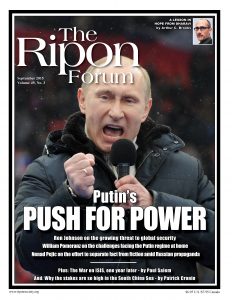Latest edition features essays by Senator Ron Johnson, William Pomeranz, & Nenad Pejic, among others, plus perspective from Arthur Brooks and a profile of Maryland Governor Larry Hogan

WASHINGTON, DC – With Russia on the march in Ukraine, ISIS on the rise in the Middle East, and China expanding its footprint in the South China Sea, the latest edition of The Ripon Forum looks at some of the key threats facing the U.S. in an uncertain and increasingly volatile world.
“As we mark another anniversary of 9/11,” stated Forum Editor Lou Zickar, “one can’t help but compare the world we live in today with the world we left behind 14 years ago. The terrorist attacks shattered the sense of invincibility that had built up in America following the end of the Cold War. In the years since the attacks, that sense has been further punctured by our seeming inability to shape world events. The rise of ISIS. The expansion of China. The very real danger that Russia poses to the West. With the possible exception of China, these threats were unimaginable on September 10, 2001. And yet today, they represent perhaps the three greatest challenges we face around the world.”
The Forum examines these challenges in its latest edition. Leading the coverage is an essay by Senator Ron Johnson, who serves as Chairman of the Senate Foreign Relations Subcommittee on European and Regional Security Cooperation and is Chairman of the Senate Homeland Security Committee, as well. In his essay, he writes about President Obama’s failed attempt to “reset” U.S. relations with Russia after he took office, and Vladimir Putin’s push for power in the ensuing years. He also offers up this warning about the direction the Russian President is taking his country. “As Putin advances,” the Senator writes, “the Obama administration continues to talk about offering Putin ‘off ramps.’ To prevent even greater destabilization in Europe, the West must realize that Putin isn’t looking for ‘off ramps.’ He’s only biding his time and looking for the next ‘on ramp.’”
Johnson’s warning is echoed by William Pomeranz, the Deputy Director of the Kennan Institute at the Wilson Center. Pomeranz writes that Russia “has been put on a wartime footing,” and adds that, “Putin can’t back down from any of these policies without losing face and considerable political leverage.” But Pomeranz also argues that Putin’s time may be running out due to his country’s deepening economic concerns. “What ails the Russian economy?” he asks. “Take your pick. Up until now, Putin has always made sure that pensions keep pace with inflation and are paid in full. Now, because of the collapse in the price of oil and deep recession, that type of money is simply not available. Putin risks alienating Russian pensioners – perhaps his most loyal group of supporters – by no longer providing pensions that are linked to the rate of inflation.”
Russia’s economy may be collapsing, but, according to Nenad Pejic, its PR machine is in full gear. Pejic serves as Editor-in-Chief of Radio Free Europe/Radio Liberty. In this role, he not only leads the effort to counter Russian propaganda, but understands the difficulty – and importance of – making sure the truth is known. “As Russia attacks the post-World War II security structure,” Pejic writes, “RFE/RL’s task has less to do with outsmarting censors – although new Russian laws are constantly expanding authorities’ power to police content – than cutting through a haze of lies and absurdities designed to blur fact and fiction and overwhelm reason.” It’s an uphill battle, for sure. Pejic notes that Russia is estimated to spend “in excess of half a billion dollars annually on RT, its state-run English language mouthpiece.” By comparison, he adds, “RFE/RL’s budget – spread among 20 languages – is $104 million.”
In addition to examining the threat posed by Russia, the latest edition of the Forum also looks at the President’s strategy to destroy ISIS, which, writes Paul Salem of the Middle East Institute, is stuck in stalemate. Patrick Cronin of the Center for a New American Security writes about the challenge facing America in the South China Sea, a region which lies at the “nexus” of the global economy, and one, Cronin argues, where the U.S. must stand up to China’s increasingly aggressive territorial claims. And in a pair of essays, Gordon Gray and Rachel Hoff discuss the U.S. defense budget, while Patrick Jephson reflects on how the United States is viewed abroad.
In other essays: Arthur Brooks of the American Enterprise Institute writes about “A Lesson in Hope from Dharavi” and looks at how free market principles have transformed India over the past 20 years; Senator John Thune and Congressman Mike Bishop write about “Tackling the Troublesome Tax Code” and legislation they have authored to do just that; Trey Grayson writes about how one community in Kentucky is addressing “The New Epidemic” of heroin abuse; and, William McKenzie reflects on his tenure as Editor of The Ripon Forum and the accomplishments of “Ripon in the Reagan Years.” And in the latest Ripon Profile, Maryland Governor Larry Hogan discusses his first year in office and his courageous battle to defeat cancer.
The Ripon Forum is published by The Ripon Society, a public policy organization that was founded in 1962 and takes its name from the town where the Republican Party was born in 1854 – Ripon, Wisconsin. One of the main goals of The Ripon Society is to promote the ideas and principles that have made America great and contributed to the GOP’s success. These ideas include keeping our nation secure, keeping taxes low and having a federal government that is smaller, smarter and more accountable to the people.



